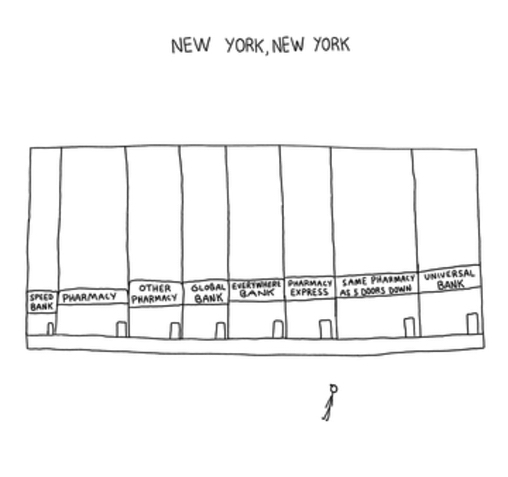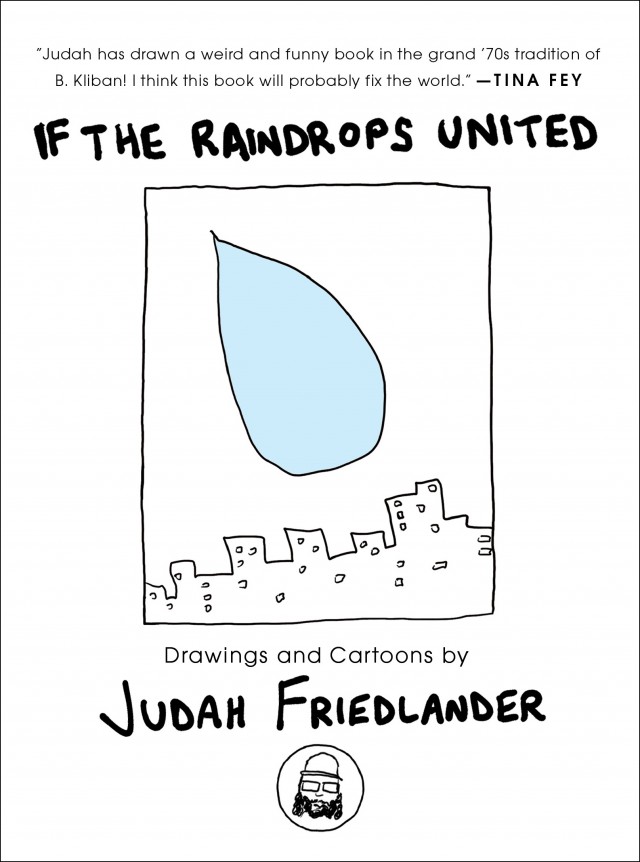Judah Friedlander, World Champion of the Single Panel Cartoon


Judah Friedlander is pretty amazing. Not only is he a brilliant comedian, karate world champion, and accomplished actor, but he’s a very thoughtful guy. When he’s not busy making people happy on stage and on screen, he’s often putting some serious consideration into the woes of those around him. And luckily for us, all that humor and all that thoughtfulness is on display in his latest book If The Raindrops United. The book is a series of illustrations that range from one page, purely visual jokes to multi-page mini graphic novels. They cover the purely absurd, the serious-funny, and some don’t even have a punchline, just a message. The book is available October 20 and Judah will be celebrating its release with two NYC events.
Launch day is going down at The Village Underground, the 8 pm show features Marina Franklin and a long set from Judah, plus everyone in attendance gets a copy of the book. Wednesday night, Judah heads to Powerhouse Arena to spread all that Judah goodness into Brooklyn.
We talked with Judah about his book and got in depth about on of the subject it covers, the ever changing identity of New York City.
The Interrobang: A lot of the structure of the jokes in the images reminded me of the structure of jokes in your set. You can really see the Judah mind at work.
Judah Friedlander: Only one drawing is actually from my act, it’s the one with the rabbit running across the field with a human foot for luck. Stand-up is my main thing, but I like doing comedy in all areas. So some of the things I might think of may work better as a movie or a short video and some work better as drawings. Like the one in there with the toes, that works better as a drawing than as a stand-up bit, it’s a visual joke. Then some drawings are a combination of visual and verbal jokes. I guess it’s all me doing it so it’s good it all seems like it fits. I’ve been drawing all my life, but I really just got back into it. It started when I was traveling a lot, there’s the anxiety and so much downtime. So instead of just doing busywork or watching a video to take a break, I just started drawing again. And I like promoting my shows in different ways, so I had been hiring people to draw posters for me, and then I just started drawing up my own posters. After a while, I realized I had forty or so drawings and thought, “Maybe I’ve been working towards a new book without realizing it.” So I just had to go with what my natural flow was.

The Interrobang: Some things are just silly and some things are very serious, so it’s like, “Oh wow, we’re really seeing what’s on Judah’s mind.”
Judah Friedlander: Yeah, the majority of the book is just comedy. But then some of it is comedy but it’s sort of dark satire, and dealing with big human rights issues, whether it’s racism, classism or gentrification. The past few years in my stand-up act, I’ve been doing a lot more dealing with heavy issues – gun rights, women getting time off after having a baby, racism – but I don’t do it in a preachy way. I do it in my own absurd, twisted, bizarre kind of way. But there are a few drawings in the book that are heavy hitting, it’s not supposed to be funny. That’s something you just can’t do in stand-up, flat out serious statements. Even if I’m talking about really serious issues, I still want laughs to be coming constantly.
I experimented with the format at first. I started by just putting them in groups – the pure comedy, the pure visual, the more serious. But that didn’t work, it just had a flat vibe because it was so organized and that’s not how my mind thinks. I literally might be thinking a happy thought one moment and then the next two hours, I’m just thinking about horrible human atrocities I read about in the news. My brain is going in all different directions at all times, so I thought that was the best way to structure the book. And then once it’s out of my hand, it’s yours to experience as you want.
The Interrobang: One thing that really shows through in your book is your great love of New York City, and in some cases, what it used to be.
Judah Friedlander: Well, it’s a love-hate. I do love it but there’s things I can’t stand about it. It’s always changing and even changing identities. The identity is has now versus twenty years ago is just massive. Much more of a corporate city and less artistic than it used to be. I mean, in Manhattan, Italian people used to live in Little Italy, there used to be neighborhoods that were very distinct. Even in stand-up, when you look at the late eighties/early nineties, when a Wall Street crowd came into the show, you knew it. Now almost the whole city is finance. The East Village was Latino, it was Ukrainian, it was bohemian, it was druggies, it was a very different kind of neighborhood. Now it’s wealthy families and finance people. I think Manhattan masquerades as a diverse city, but it’s pretty much one demographic – wealthy. It’s just not the melting pot that it was.
The city also used to be more dangerous, but you were able to get a cheap apartment in Manhattan. It may not be the safest neighborhood in the world but it was cheap so you could come here and do your art. I don’t think young people are moving here to do art in the numbers that it used to be. More are going to LA and other cities. That’s why I think it’s more important than ever to do art [ in NYC] and fight for the art and not just leave. When I first started doing open mics, they usually took place in shitty dive bars. And I’m talking the kind of bars where there’s two guys in the whole bar, the only customers they have are two guys in their 60’s, like career alcoholics. Some of these were in the Village or Chelsea, now you couldn’t find a bar there that’s empty. Every bar is packed with young people who have disposable income. In one sense, for comedy, it’s good because there’s more paying audience now. There’s more places you can put on a show and people will actually show up. And people aren’t afraid to go out at night anymore. In Times Square or Hell’s Kitchen, it used to be the owners were worried about the customers and comedians when they were coming in and out of the club.
Often in Manhattan [now] I feel like I’m in a resort town or some version of Vegas. A club like The Comedy Cellar, they get tourists but they have a huge following among people who live here. But there’s a lot of clubs in the city who really only rely on tourists, so as a comic you almost feel like you’re in Vegas because you’re only performing for tourists. Then if you go to rooms in Brooklyn, it’s the opposite, but even then, most of them aren’t from Brooklyn or New York. Those crowds are usually well-educated people who have moved here from other places. Whereas years ago, I remember doing Pips out in Sheepshead Bay in Brooklyn and everyone in the crowd was born and bred Brooklyn. Those are much harder to come by now.

The Interrobang: It’s funny because you always think of LA being the more transplant or transient city than New York.
Judah Friedlander: Well, New York is transient, people just stay here for a longer time. They move here in their 20’s and then they get married and start having kids, so it’s like, “Ok, we need more space, let’s get the fuck out of here.” Where in LA, it’s cheaper and easier to just show up and start living and also just leave. And people have cars, New Yorkers are stuck. You’re really stuck on an island. New York eats up all your money, you have no car, what are you going to do, take a bus to another city where they have no public transportation?
Most of the people I meet who are new to New York came here for good, high paying jobs. They didn’t move here to become a dancer or an actor or a comic. Years ago, I would meet more people who were coming here to do something in the arts. Or who knows, maybe it’s my age, maybe I’m more out of touch than I think I am. But I think I’ve got the big picture of it.
Buy Judah’s Book “If the Raindrops United” on Amazon, BN.com and at independent booksellers everywhere. Buy a few and your Christmas shopping is done! Here’s where to find him on tour and get them signed.
10/20 – NYC @ Village Underground, stand-up show *ticket includes book and show
10/21 – Brooklyn, NY @ Powerhouse Arena, 7pm Signing / Talk / Q&A
10/26 – Boston, MA @ Brattle Theater/Harvard Bookstore, Signing / Talk/ Q&A
10/29 – Madison, CT @ RJ Julia Independent Booksellers, 7pm Signing / Talk / Q&A
11/3 – Washington, DC @ DC Improv, stand up show *ticket includes book and show
11/4 – New Orleans, LA @ Tulane University, stand-up show
11/11 – LA, CA @ Hollywood Improv, stand-up show *ticket includes book and show
11/13 – LA, CA @ Skylight Books, Signing / Talk / Q&A
11/18 – Toronto, ON @ Comedy Bar, stand up shows at 8pm & 10pm
11/19-21 – Buffalo, NY @ Helium –stand up shows
11/30 – Washington, DC @ Politics & Prose Book Store, Signing / Talk / Q&A
12/2-5 – Philadelphia, PA @ Helium, stand-up shows

Read more original interviews. And visit our home page for the latest comedy news, interviews, and more.
Latest posts by Amy Hawthorne (see all)
- Mike Cannon’s Field Guide to Doing Drugs - September 6, 2017
- Ryan Hamilton’s Long Road From VHS to Netflix - August 29, 2017
- Brent Morin Gets Unplugged at Just for Laughs Solo Show, Makes the Most of Rough Conditions - July 28, 2017
